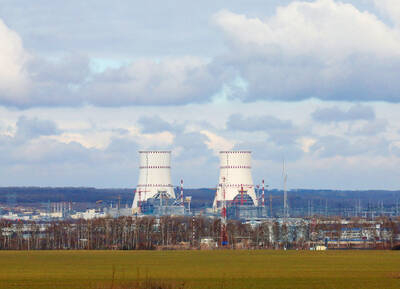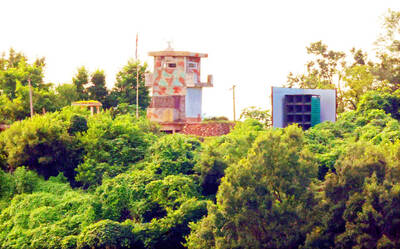US President George W. Bush on Tuesday signed a controversial law allowing secret overseas CIA prisons, harsh interrogation tactics and military trials as weapons against suspected terrorists.
The legislation, dubbed by rights critics as the "torture bill" and which US lawmakers approved last month after bitter debate, also allows the US to detain alleged terrorists indefinitely, officials said.
Bush said that the law ratified strategies that have prevented terrorist attacks on the US and paved the way for a military trial of the alleged architect of the September 11, 2001 attacks, Khalid Sheikh Mohammed.
"The bill I sign today helps secure this country, and it sends a clear message: This nation is patient and decent and fair, and we will never back down from the threats to our freedom," Bush said at a White House signing ceremony, flanked by top US military and intelligence officials.
With just three weeks before key Nov. 7 elections to decide control of the US Congress, Bush and Republicans wasted no time in using the measure against Democrats who opposed it, accusing them of being soft on terrorism.
"The debate over this bill has been heated, and the questions raised can seem complex," the president said.
"With the distance of history, the questions will be narrowed and few: Did this generation of Americans take the threat seriously, and did we do what it takes to defeat that threat? Every member of Congress who voted for this bill has helped our nation rise to the task that history has given us," he said.
Republican House Speaker Dennis Hastert bluntly charged that the Democrats hoped to "gingerly pamper the terrorists who plan to destroy innocent Americans' lives."
Democratic Representative Ed Markey said that the legislation "will not make us more secure," charging it would raise the risk US military personnel will be tried overseas, undermine the Geneva Convention and provide "retroactive immunity" to US interrogators who may have committed war crimes.
Bush dismissed allegations that the legislation guts US commitments to the Geneva Convention on wartime prisoners and okays interrogation procedures that critics have branded torture, like extended sleep deprivation and a procedure in which a detainee is made to feel like he is drowning.
"This bill complies with both the spirit and the letter of our international obligations. As I've said before, the United States does not torture. It's against our laws and it's against our values," he said.
Outside the White House, roughly 200 demonstrators protested the law, with one waving a sign that said "Bush Torture Law Shames America."
About 15 were arrested, according to organizers.
The American Civil Liberties Union (ACLU) slammed the law as "one of the worst civil liberties measures ever enacted in American history."
"The president can now -- with the approval of Congress -- indefinitely hold people without charge, take away protections against horrific abuse, put people on trial on hearsay evidence, authorize trials that can sentence people to death based on testimony literally beaten out of witnesses," ACLU executive director Anthony Romero said in a statement.
The measure was drafted in response to a US Supreme Court ruling in June that Bush had overstepped his powers and breached the Geneva Conventions by setting up special war crimes tribunals for "war on terror" suspects.
It was expected to face immediate legal challenges that could once again take the issue to the nation's highest court -- albeit well after the election.
The legislation sets guidelines for interrogating suspected terrorists and could send several hundred inmates held at the US naval base in Guantanamo Bay, Cuba to trial after years of detention. Not one of the detainees held there over the past five years has been tried.

Philippine President Ferdinand Marcos Jr has fired his national police chief, who gained attention for leading the separate arrests of former Philippine president Rodrigo Duterte on orders of the International Criminal Court and televangelist Apollo Carreon Quiboloy, who is on the FBI’s most-wanted list for alleged child sex trafficking. Philippine Executive Secretary Lucas Bersamin did not cite a reason for the removal of General Nicolas Torre as head of the 232,000-member national police force, a position he was appointed to by Marcos in May and which he would have held until 2027. He was replaced by another senior police general, Jose

POWER CONFLICT: The US president threatened to deploy National Guards in Baltimore. US media reports said he is also planning to station troops in Chicago US President Donald Trump on Sunday threatened to deploy National Guard troops to yet another Democratic stronghold, the Maryland city of Baltimore, as he seeks to expand his crackdown on crime and immigration. The Republican’s latest online rant about an “out of control, crime-ridden” city comes as Democratic state leaders — including Maryland Governor Wes Moore — line up to berate Trump on a high-profile political stage. Trump this month deployed the National Guard to the streets of Washington, in a widely criticized show of force the president said amounts to a federal takeover of US capital policing. The Guard began carrying

Ukrainian drone attacks overnight on several Russian power and energy facilities forced capacity reduction at the Kursk Nuclear Power Plant and set a fuel export terminal in Ust-Luga on fire, Russian officials said yesterday. A drone attack on the Kursk nuclear plant, not far from the border with Ukraine, damaged an auxiliary transformer and led to 50 percent reduction in the operating capacity at unit three of the plant, the plant’s press service said. There were no injuries and a fire sparked by the attack was promptly extinguished, the plant said. Radiation levels at the site and in the surrounding

‘DELIBERATE PROVOCATION’: Pyongyang said that Seoul had used a machine gun to fire at North Korean troops who were working to permanently seal the southern border South Korea fired warning shots at North Korean soldiers that briefly crossed the heavily fortified border earlier this week, Seoul said yesterday after Pyongyang accused it of risking “uncontrollable” tensions. South Korean President Lee Jae-myung has sought warmer ties with the nuclear-armed North and vowed to build “military trust,” but Pyongyang has said it has no interest in improving relations with Seoul. Seoul’s military said several North Korean soldiers crossed the border on Tuesday while working in the heavily mined demilitarized zone (DMZ) separating the two Koreas. The incursion prompted “our military to fire warning shots,” South Korea’s Joint Chiefs of Staff